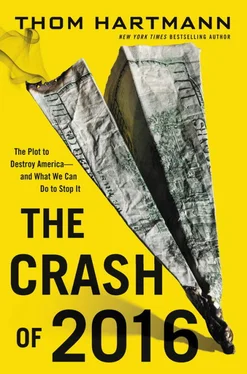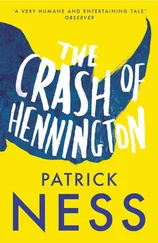Your Federalist Party, which grew out of the ashes of our Republican Party after its internecine wars with its billionaire-funded Tea Party faction, began to convince people that the social safety net that had kept our nation stable and secure for two generations was a terrible thing. They argued that too much money was going to the lower rungs of society, particularly those they suggested oh-so-subtly were genetically and intellectually inferior. Those people should know their place, and it was ridiculous, they said in the 2060s, that everybody should enjoy basic levels of safety and security in society. After all, they said, without the threat of homelessness and illness, why would they ever bother to get out and work?
Of course, what all that rhetoric hid was the Federalists’ efforts to shift wealth—and power, particularly political power—from the “rabble” (as Federalist John Adams called the working classes) to the Economic Royalists themselves. Steadily, steadily, through the 2070s and 2080s, they cut away at the social safety net. And just like Warren Harding in 1921 and Ronald Reagan in 1981, your Federalist politicians put in place policies—from huge tax cuts on the Economic Royalists to dilution of the anticorruption laws passed in 2016–17—that cut the economic and political power of average working people and shifted it to the corporate and inherited-wealth elite.
If you’d looked back at our history, from the eras of the Cotton Kings in the 1850s to those of the Robber Barons of the 1900s, the Economic Royalists of the 1930s, and the Republicans of the 1980s, you’d have seen the beginnings of the process. The front men for the Economic Royalists—you call them the Federalists, we called them the Republicans, during Lincoln’s era he called them Secessionists—were busy as termites gnawing holes through the policies that had kept them in check for two generations.
Through that third generation of the 2060s and 2070s, nobody much noticed, although the political rhetoric had taken on a harder edge. By the 2080s, they had pretty much seized control of most state and federal legislative and judicial bodies. And they had the economy roaring white-hot, making the top 1 percent richer than any kings of old, before the crash that happened in 2090.
Learn from history.
With the invention of the cotton gin and other steam-operated machinery, our economy in the American South had exploded in the 1840s and 1850s. Same with the banking industry in the American North. And then they all collapsed in the Great Crash of 1856, which led to the Civil War.
While our economy had been largely based on slavery before the Civil War, we built our way out of it with the Industrial Revolution and the use of coal and oil for power instead of the muscles of slaves. But that, too, got taken over by the Economic Royalists in the 1920s, leading to the Great Crash of 1929.
Out of the ashes of that crash, America was rebuilt by the New Deal, whose cornerstones were high tax rates on the Royalists, unions for the workers, and a well-informed electorate thanks to the Fairness Doctrine, which required radio and TV stations to give free time to political candidates. All three of those pillars began to disintegrate during the 1980s with Reagan, leading to a generation of “hot-bubble” economies, just like you were experiencing before your crash.
After our Crash of 2016, we built our way back to prosperity by using alternative energies, building a national transportation and energy infrastructure, and stripping the Economic Royalists of their ability to pursue so-called “free trade” policies that not only decimated our nation but those we traded with as well. We shifted from Reagan’s laissez-faire economics to the regulated economics of the Founders, of Lincoln, of FDR. And we built large community- and national-based cooperatives as alternatives to raw capitalism, with workers having ownership stakes in the businesses for which they worked.
You, too, are now facing an economy in ruins and a world in turmoil. Climate change has altered the face and economy of every nation on the planet, and your generation of Economic Royalists figured out how to profit from it, watching the trends and carefully buying and selling lands and businesses as people were forced to move from areas where deserts were on the march into areas that had become more habitable than before. But they overreached, ended up owning too much in too few hands, and so—just like in all the cycles before, you and your children are paying for their greed.
Learn from our mistakes, and from what we got right.
You won’t have novel new power and economic stimulants such as steam, the way Lincoln’s generation did. You won’t have oil as a new resource, the way Teddy Roosevelt’s generation did. You won’t have unions, the way Eisenhower’s generation did. And you won’t have the explosion of an alternative-energy economy, the way my children’s generation did in the years after the Obama administration and the recovery from the Great Crash of 2016.
But there will be something new in each of those areas.
Looking forward from 2013, as I am now, I don’t know what it will be. But the one thing history—over ten thousand years of the history of civilization—tells us is that it will be something .
Use it. But be very, very careful that, in doing so, you don’t hand your generation of Economic Royalists another tool they can use to once again rise up like lords and kings to take control. Keep it decentralized. As Thomas Jefferson urged at the founding of our nation, keep both power and economic strength local and broadly based. That will keep political power local and broadly based as well, which is the surest way to have stability going forward into the future.
A pyramid standing on its base is stable, although unlike the Egyptian pyramids, the pyramids of economies and political systems are made of stuff that changes from generation to generation: agriculture and human/animal power, coal and steam power, oil and industrial power, solar and cooperative power.
As you make the transition into a new world and a new economy, rising out of the ashes of the crash your generation of Economic Royalists brought you, always remember that they will still be there. They’ll be watching and planning and grasping for the levers that will bring them back on top. Be careful and—as Dwight Eisenhower warned my generation in his Farewell Address—be “ever vigilant” against that “misplaced power” that they are seeking.
It’s unlikely that you’ll be able to stop altogether the rise of the Economic Royalists during the lifetimes of your children and grandchildren. They’ve always figured out a way to pull it off, all the way back to the era of Gilgamesh, seven thousand years ago in Uruk (what we now call Iraq).
But please do your best to send a warning to your future generations. Don’t do like we did with Reaganomics and blow up the protections for your working people. Don’t jump into the equivalent of our Clinton/Gingrich/Greenspan experiment of deregulating the institutions owned by the Economic Royalists.
Tell your children, and ask them to tell theirs.
Maybe, just maybe, you and your peers can break these cycles of history, stop the boom-bust-war merry-go-round that this nation (and the world) has endured for more than half a millennium since Elizabeth I chartered the East India Company in 1601.
Because, just as democracies will always have Economic Royalists looking for ways to subvert them to their own ends, they will also always have people who remember the lessons of history. People who know the possibility of a stable world at peace. People willing to sacrifice and work and put themselves on the front lines of history to build a better world.
Читать дальше












